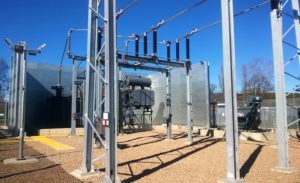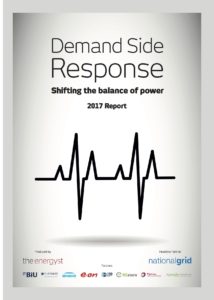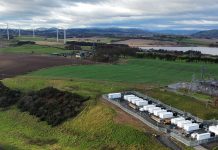
Western Power Distribution and UK Power Networks have rejected suggestions that they could potentially abuse monopoly positions in procuring flexibility to help balance their power networks.
Both distribution network operators (DNOs) are beginning their shift towards a distribution system operator (DSO) model and asking businesses to provide flexibility to help manage network constraints.
Aggregators and suppliers procuring demand-side response are concerned they may become a competitive threat.
Alastair Martin, chief strategy officer at aggregator Flexitricity, told The Energyst that innovation projects underway by DNOs should remain purely as learning projects.
He cited WPD’s moves under Project Entire “which is essentially about aggregation and taking some people into other balancing programmes”.
Martin said he was “opposed to that”.
“I don’t think Western Power Distribution should be competing with their customers. They are doing it under an innovation project, so it is not a commercial launch,” said Martin.

“Once they have learned what they need to learn from that project, they should drop any idea of becoming a bundled actor with competitive pressures to favour some customers over others. That is the wrong way to do it.”
Martin called for “rules of engagement between the DNOs and National Grid, not DNOs stepping in, becoming the route to market and being in a position to have an incentive to favour people who sign with them”, he said. “That is clearly anticompetitive and [DNOs] should stop dreaming that that is a good idea.”
Other aggregators have voiced similar concerns.

UK Power Reserve’s Ian Tanner suggested that “some of the DNOs are almost trying to create ‘nationalised’ aggregators within their regions” potentially locking out commercial aggregators.
Tanner said that development would “damage competition in the market and potentially the end consumer, because they would have no option but to go through the DNO. Which would be quite detrimental to the prices they can secure”.
Given much DSO transition work is being advanced via Ofgem’s innovation allowances, Tanner suggests the regulator “arguably does not understand the risks [to competition] that they are funding”.
Eamonn Boland, of Baringa Partners suggests that may be a valid fear.

“I think generators, I&C consumers, the people who own flexibility, will in the future potentially contract directly with DNOs and/or the system operator,” he said.
That would lead to a shift in role for commercial aggregators.
Rather than acting as a route to market for frequency response or voltage control, they would instead seek to “add incremental value to an individual asset by looking at it across a portfolio, or looking across other revenue streams”, Boland suggested.
“I definitely think there is a movement towards the providers of flexibility contracting directly with the DNO and the SO,” said Boland. “That means the generic, green field asset, going forward, will not have as much value as one that is strategically located.”
Boland, Martin and Tanner were interviewed for The Energyst’s 2017 DSR report (available as a free download here).
The question was also raised earlier this month at the associated DSR Event in London, where both WPD and UKPN outlined their nascent DSR procurement approaches.
Both DNOs underlined that their projects were learning exercises and that it would take collective industry effort to find the right models and interfaces so that the DSR market does not become more confused and potentially conflicted from a customer perspective.
But one supplier questioned whether “going head-to-head with a local monopoly” that controls connections and export agreements could rule out genuinely level playing fields.

In response, Matt Watson, innovation & low carbon networks engineer at Western Power Distribution, said the connections process was standard, regardless of asset purpose, so that DNOs would be “impartial” from that perspective.
In terms of DSR services, Watson said he hoped customers – aggregators and suppliers – would see DNO procurement as “an opportunity rather than a threat; this is about trying to add more value into the markets”.
Sotiris Georgiopoulos, head of smart grid development at UK Power Networks, said licence conditions prevented DNOs from abusing their position.
“If we are distorting the market or [engaging in] anti-competitive behaviour, we can lose the licence to operate,” he said.

“But aside from the legal aspect, we are venturing into new roles that we did not have in the past. There is an obligation on us to do that in a way that is trustworthy. So transparency will be key.”
 The 2017 DSR report features interviews with DSR providers including Marks & Spencer, NHS Scotland, Partner Logistics, Unite Students and Welsh Water.
The 2017 DSR report features interviews with DSR providers including Marks & Spencer, NHS Scotland, Partner Logistics, Unite Students and Welsh Water.
It also contains views on market challenges and opportunities from industry participants, suppliers and aggregators, plus a survey of 180 end-users on their views towards DSR and battery storage.
Download the report here.
The report is sponsored by National Grid, BIU, Enernoc, Engie, Eon, G59 Professional Services, Restore, UK Power Reserve and Total Gas & Power.
Related stories:
Shifting the balance of power: New, free demand-side response report
Battery storage to push frequency response revenues down STOR’s path?
Mitie DSR chief: Nothing can replace lost Triad value
Strong SME appetite for DSR but sector ignored by aggregators
UK Power networks tenders for 35MW of DSR to go live January 2018
UKPN and WPD step up calls for industrial and commercial firms to provide flexibility
20 firms outline what it stopping them providing DSR
Battery storage: Finance a challenge but businesses predict 3-7 year paybacks
Energy storage ‘will wipe out’ battery storage
UK Power Networks outlines smart grid plans
UKPN sees battery boom, outlines DSR plans
Government sets out smart grid vision
WPD ramps up DSR trials, calls for participants
Ofgem: Energy flexibility will become more valuable than energy efficiency
Smart grids ‘require local control and businesses must play or pay’
Rewrite rules for DSR and power networks, urges thinktank
National Grid adds 500MW of flexibility in 2016, more to come
Eon: Avoid DSR sticking plasters and long-term contracts
WPD launches DSR aggregator business
As solar subsidies wane, investors plan 2.3GW of battery storage projects
Free report: DSR and battery storage
Follow us at @EnergystMedia. For regular bulletins, sign up for the free newsletter.



